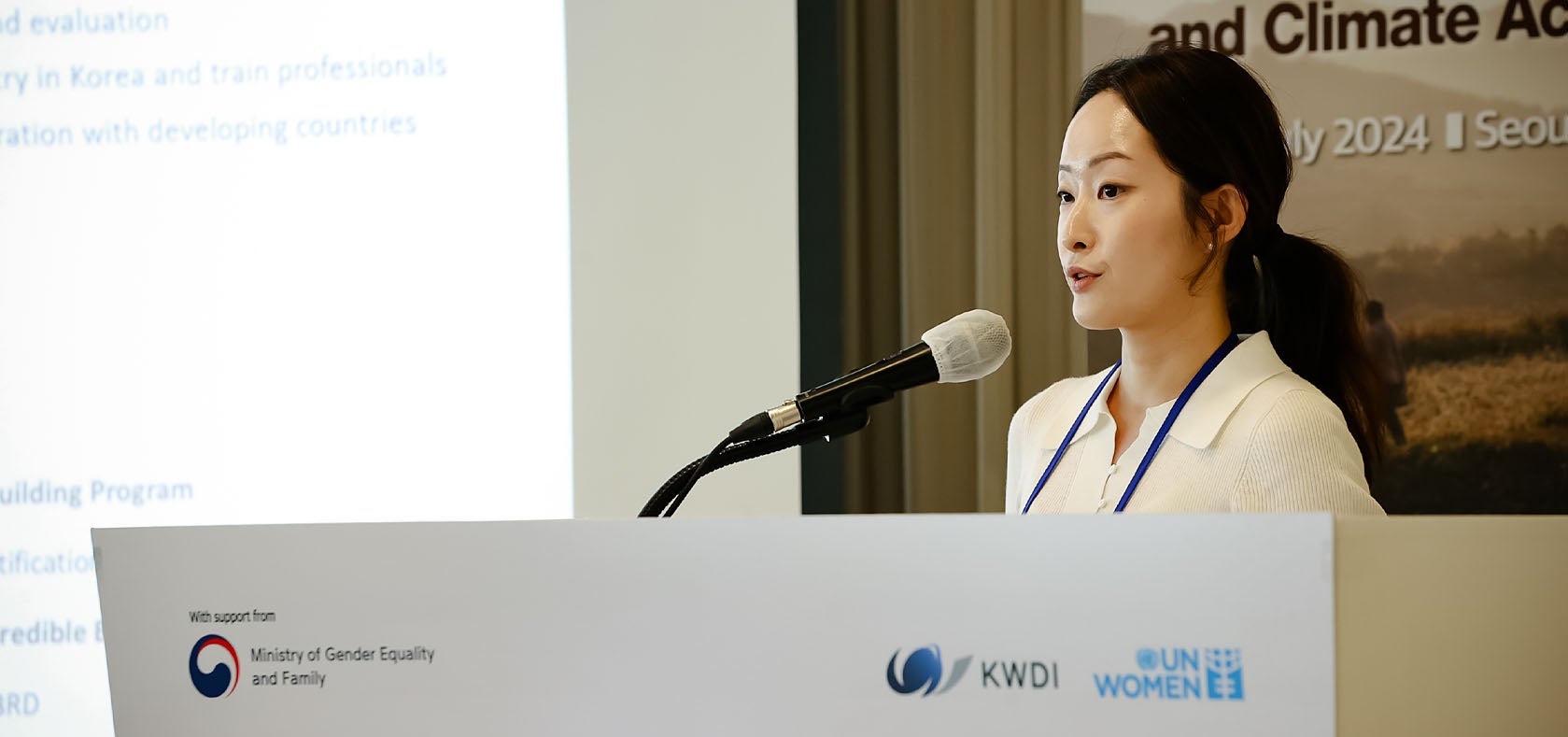From Where I Stand "젠더 대응적 기후 행동을 이행하려면 충족해야 하는 전제조건은?"
김야야씨는 공적개발원조(ODA)를 전문으로 하는 글로벌 컨설팅사인 한국개발전략연구소의 연구위원입니다. 그는 10년 이상의 국제 개발 경험을 바탕으로, 유엔여성기구 성평등센터와 한국여성정책연구원(KWDI)이 공동으로 주최한 ‘성평등 및 기후 행동을 지향하는 국제개발협력 활성화를 위한 워크숍’에 초청 연사로 참여하였습니다. 해당 워크숍은 국제개발 분야 실무자들에게 젠더 대응적 기후 행동 전략을 제공하고, 이를 효과적으로 구현할 수 있도록 역량을 강화하는 것을 목표로 했습니다. 이 자리에서 그는 기후변화 ODA의 성 주류화에 대해 발표하며, 이와 관련한 난관과 향후 과제를 다루었습니다.


개발도상국에서 개발 프로젝트에 종사하는 기후 변화 실무자로서 저는 기후 변화와 관련된 성 격차 문제를 해결하는 데 종종 어려움을 겪습니다. 이러한 프로젝트에서 성 주류화는 항상 어려운 과제로 남아 있어, "우리는 얼마나 진전을 이루었는가? 어디까지 왔는가? 의미 있는 기여를 했는가?"라는 질문을 끊임없이 제기하게 됩니다. 안타깝게도, 이 질문들에 대한 답은 여전히 불확실하게 느껴질 때가 많습니다.
젠더 대응적 기후 행동을 위해서는 몇 가지 전제 조건이 충족되어야 합니다. 리더십은 성 주류화에 대한 약속과 인식을 강화해야 하며, 프로젝트 실행자들은 각자의 역할과 관점에 따라 이를 깊이 이해해야 합니다. 성 주류화의 중요성에 대한 합의를 형성하는 것 역시 매우 중요합니다. 다양한 역량 수준에 맞춘 단계별 교육 프로그램을 제공하고, 관련 지침과 프로토콜에 대한 세세한 지침을 제공하는 기회가 더 많이 필요합니다.
또한 부문별로 보다 구체적인 성평등 전략과 지침이 마련되어야 합니다. 이해관계자들에게 성평등과 성 주류화에 대해 더 많이 홍보하고 교육하기 위한 노력이 더욱 강화되어야 합니다. 참여를 독려하기 위해 성평등 요소를 의미 있게 통합하고, 이를 실행할 수 있는 제도적 메커니즘을 확립하는 것이 중요합니다.
마지막으로 이러한 노력에 참여하는 성평등 전문가가 부족한 실정입니다. 성평등 전문가와 개발 협력 전문가 간의 협력이 필수적입니다. 개발도상국의 맥락에서 개발 협력을 이해하는 성평등 전문가와, 성평등 관점을 잘 이해하는 개발 전문가가 함께 협력하여 이러한 문제들을 해결해야 합니다.
그럼에도 불구하고 현장에서 작지만 의미 있는 변화가 일어나는 것을 목격했습니다. 예를 들어 인도네시아의 작은 섬 마을에서 한 남편이 아내가 마을의 태양광 발전소의 일일 운영 및 유지보수 담당자로 선정된 것을 자랑스럽게 인정한 사례가 있었습니다. 이는 여성이 사회적으로 중요한 역할을 수행하는 것에 대한 지역사회의 인식 변화를 서서히 일으키고 있습니다. 아직 해결해야 할 과제가 많지만, 이러한 작은 발걸음들이 변화를 일으키고, 그 시작을 알리고 있습니다.
기후변화에 있어서 성 주류화는 아직 초기 단계에 있으며, 앞으로 많은 과제가 남아 있습니다. 무엇이 성취되었고 성취되지 않았는지에만 집중하기보다는, 이미 (젠더 대응적 기후) 행동이 진행 중이라는 사실에 주목해야 합니다. 이제는 다음 단계를 고려해야 할 때입니다. 앞으로 무엇을 더 할 수 있을지, 어떻게 더 효과적으로 실행할 수 있을지 고민해야 합니다. 지속적인 성찰과 개선, 그리고 구체적인 행동이 발전을 위해 반드시 필요할 것입니다.
김야야씨는 아시아, 북미, 중남미, 카리브해, 유럽 등지에서 환경, 기후 변화, 에너지, 폐기물 관리, 녹색 성장 등을 다루며, 지속가능개발목표(SDGs) 5(성평등), 13(기후 행동) 등을 아우르는 국제 개발 전문가로 활동하고 있습니다.